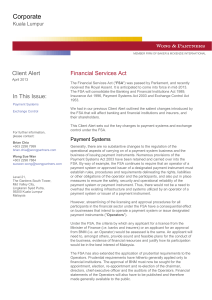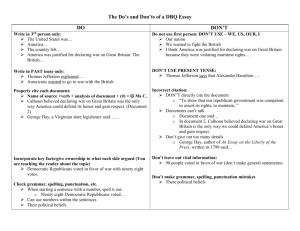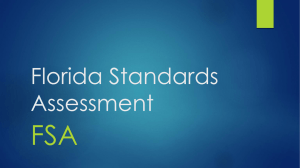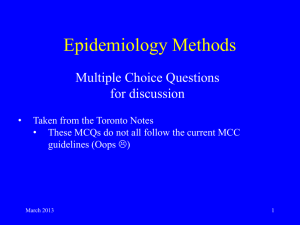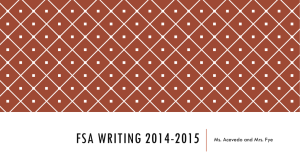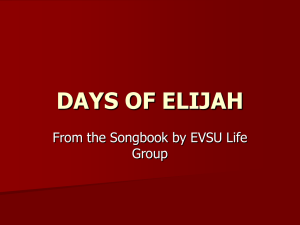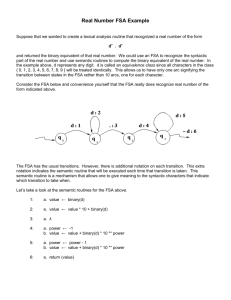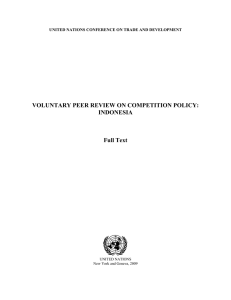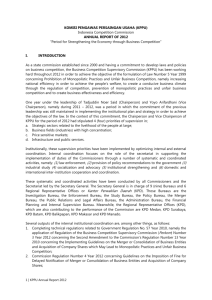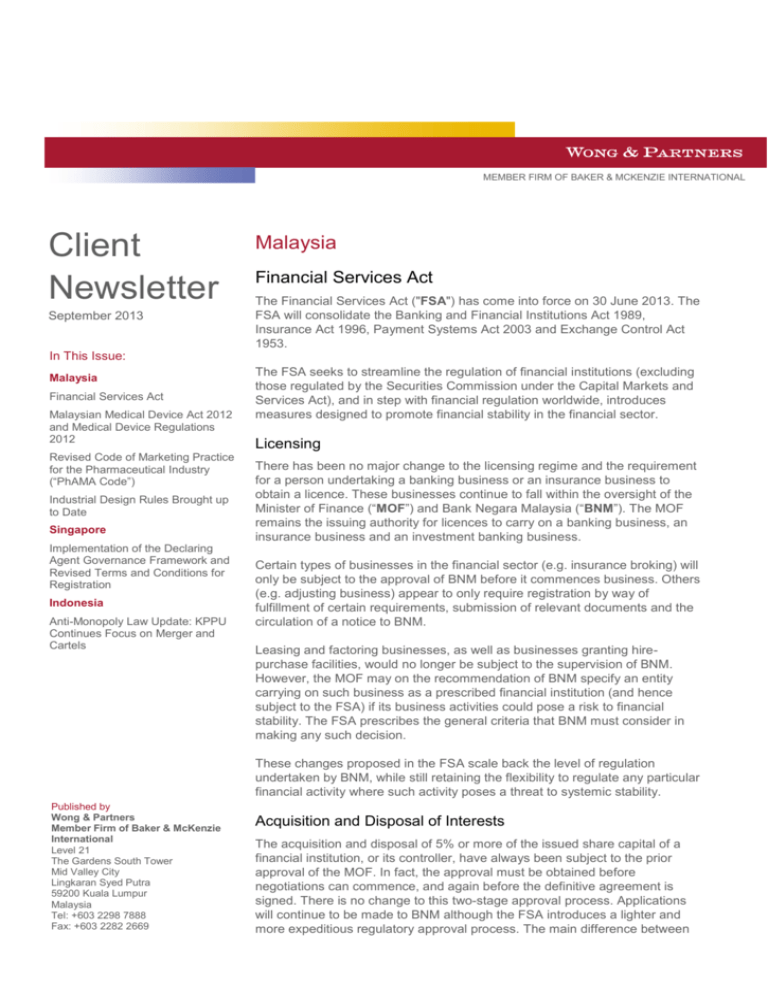
MEMBER FIRM OF BAKER & MCKENZIE INTERNATIONAL
Client
Newsletter
September 2013
Malaysia
Financial Services Act
The Financial Services Act ("FSA") has come into force on 30 June 2013. The
FSA will consolidate the Banking and Financial Institutions Act 1989,
Insurance Act 1996, Payment Systems Act 2003 and Exchange Control Act
1953.
In This Issue:
Malaysia
Financial Services Act
Malaysian Medical Device Act 2012
and Medical Device Regulations
2012
Revised Code of Marketing Practice
for the Pharmaceutical Industry
(“PhAMA Code”)
Industrial Design Rules Brought up
to Date
Singapore
Implementation of the Declaring
Agent Governance Framework and
Revised Terms and Conditions for
Registration
Indonesia
Anti-Monopoly Law Update: KPPU
Continues Focus on Merger and
Cartels
The FSA seeks to streamline the regulation of financial institutions (excluding
those regulated by the Securities Commission under the Capital Markets and
Services Act), and in step with financial regulation worldwide, introduces
measures designed to promote financial stability in the financial sector.
Licensing
There has been no major change to the licensing regime and the requirement
for a person undertaking a banking business or an insurance business to
obtain a licence. These businesses continue to fall within the oversight of the
Minister of Finance (“MOF”) and Bank Negara Malaysia (“BNM”). The MOF
remains the issuing authority for licences to carry on a banking business, an
insurance business and an investment banking business.
Certain types of businesses in the financial sector (e.g. insurance broking) will
only be subject to the approval of BNM before it commences business. Others
(e.g. adjusting business) appear to only require registration by way of
fulfillment of certain requirements, submission of relevant documents and the
circulation of a notice to BNM.
Leasing and factoring businesses, as well as businesses granting hirepurchase facilities, would no longer be subject to the supervision of BNM.
However, the MOF may on the recommendation of BNM specify an entity
carrying on such business as a prescribed financial institution (and hence
subject to the FSA) if its business activities could pose a risk to financial
stability. The FSA prescribes the general criteria that BNM must consider in
making any such decision.
These changes proposed in the FSA scale back the level of regulation
undertaken by BNM, while still retaining the flexibility to regulate any particular
financial activity where such activity poses a threat to systemic stability.
Published by
Wong & Partners
Member Firm of Baker & McKenzie
International
Level 21
The Gardens South Tower
Mid Valley City
Lingkaran Syed Putra
59200 Kuala Lumpur
Malaysia
Tel: +603 2298 7888
Fax: +603 2282 2669
Acquisition and Disposal of Interests
The acquisition and disposal of 5% or more of the issued share capital of a
financial institution, or its controller, have always been subject to the prior
approval of the MOF. In fact, the approval must be obtained before
negotiations can commence, and again before the definitive agreement is
signed. There is no change to this two-stage approval process. Applications
will continue to be made to BNM although the FSA introduces a lighter and
more expeditious regulatory approval process. The main difference between
the FSA and existing legislation is that the approval of the MOF is only
required if the proposed acquisition results in the acquirer obtaining control or
holding more than 50% of the equity interest in the licensed person. The FSA
also allows a potential acquirer/shareholder to increase its shareholding in the
licensed person without having to seek prior approval if such increase does
not exceed a multiple of 5%. (For example, a shareholder who already owns
5% of the shares of a financial institution may freely purchase additional
shares up to 10%, at which point another approval will be required.)
Disposals no longer require the approval of the MOF or BNM, unless the
shareholder is proposing to dispose of more than 50% of its interests or if the
disposal results in the shareholder ceasing to have control over the licensed
person. There is no definition as to what would constitute “control” under the
FSA.
The FSA also provides clarity on the definition of “interests in shares”, which
would include a direct interest in shares, effective interest in shares and also
aggregates legal and beneficial interests. These amendments now
standardise the treatment of banking institutions and insurance companies,
which previously had requirements that were subtly but significantly different.
Another interesting change under the FSA that will affect mergers and
acquisitions in the Malaysian financial services sector is the absence of a
requirement to adhere to the single presence rule. This rule has hitherto
prevented an acquirer holding an existing significant stake in an existing
insurance company or bank, from acquiring another insurer or bank. This has
meant that acquirers have had to acquire the assets and liabilities of a target
and merge them with the assets and liabilities of the acquirer’s existing
financial services entity.
Financial Holding Company
In line with global regulation of financial institutions, the FSA introduces the
concept of financial holding companies. Companies holding, or proposing to
hold, more than 50% equity interest in a licensed bank or insurer have to
apply to become a financial holding company (“FHC”). Approval of BNM would
be required to acquire such status. The requirement for a shareholder to attain
the FHC status only applies to companies incorporated in Malaysia. A major
or controlling direct shareholder in a bank or insurer that is incorporated
outside of Malaysia would not be subject to the FSA.
Prudential requirements that apply to licensed banks and insurers apply to a
FHC and its subsidiaries under the FSA. This entails having to seek the
approval of BNM for the appointment, election, re-appointment and re-election
of the chairman, directors, chief executive officer and auditors of a FHC. The
FHC would not be able to establish or acquire a subsidiary, whether within or
outside Malaysia, unless it has obtained the prior approval to BNM.
Further, to maintain and promote financial stability, the FSA accords BNM
broad powers to issue directions to a FHC, its subsidiaries and/or senior
officers. This includes the ability to prohibit or restrict transactions proposed to
be carried out by a group company of the FHC as well as the right to direct
that a capital-raising exercise be undertaken by the FHC.
These changes will transform the landscape of the financial sector in Malaysia
by ensuring not only that a financial institution is sound, but also its major
shareholder and management are fit and proper persons/entities. The
changes also accord BNM with the ability to ring-fence a financial institution
from other activities carried on by the major shareholder, to ensure that the
2
Client Newsletter September 2013
risks of these other business activities do not affect the ability of the major
shareholder to support the financial requirements of the financial institution.
Extension of BNM’s Powers
The FSA gives power to BNM to assume control over the whole or part of the
business, affairs or property of the financial institution, manage it and/or
appoint any person to do so on behalf of BNM, in a situation where it
considers that the financial stability of the financial institution is at risk.
As an alternative to winding-up, BNM can pursuant to the FSA designate a
bridge institution to be vested with business, assets and liabilities of the
distressed financial institution. The bridge institution is given reprieve from
having to be licensed under the FSA and if necessary, would be exempted
from compliance with the provisions of the FSA. A stay of all legal
proceedings and enforcement of any judgment, award or legal order would
also be in place to shelter the bridge institution. If required, BNM is also
authorized to provide financial assistance to the bridge institution.
Director’s Duty of Disclosure
The FSA also introduces a stringent requirement for transparency on the part
of directors of a financial institution and FHC. A director is required to disclose
to the board of directors, the nature and extent of any direct or indirect interest
in a material transaction or material arrangement with the financial institution.
Following such disclosure, the interested director will have to recuse himself
from the meeting, a governance standard that is higher than that prescribed
even for listed companies.
Insurers Carrying on Both Life and General Businesses
The FSA prohibits the carrying on of a composite insurance business. A grace
period will be granted for composite insurers to de-merge their general and life
insurance businesses into separate entities. This would align Malaysian
insurers with their counterparts in various developed countries, and will have
the effect of facilitating mergers-and-acquisitions (resulting in a further
consolidation) amongst insurers.
Payment Systems
Generally, there are no substantive changes to the regulation of the
operational aspects of carrying on of a payment system business and the
business of issuing payment instruments. Numerous provisions of the
Payment Systems Act 2003 have been retained and carried over into the
FSA. By way of example, the FSA continues to require that an operator of a
payment system or approved issuer of a designated payment instrument must
establish rules, procedures and requirements delineating the rights, liabilities
or other obligations of the operator and the participants, and also put in place
measures to ensure the safety, security and operational reliability of the
payment system or payment instrument. Thus, there would not be a need to
overhaul the existing infrastructure and systems utilized by an operator of a
payment system or issuer of a payment instrument.
However, streamlining of the licensing and approval procedures for all
participants in the financial sector under the FSA have a consequential effect
on businesses that intend to operate a payment system or issue designated
payment instruments ("Operators").
Under the FSA, the criteria by which any applicant for a licence from the MOF
(i.e. banks and insurers) or an applicant for an approval from BNM (i.e. an
Operator) would be assessed are the same. An applicant will need to,
3
Client Newsletter September 2013
amongst others, provide sound and feasible plans for the conduct of the
business, evidence of financial resources and justify how its participation
would be in the best interest of Malaysia.
The FSA has also extended the application of prudential requirements to the
Operators. Prudential requirements have hitherto generally applied only to
financial institutions. The approval of BNM must now be sought for the
appointment, election, re-appointment and re-election of the chairman,
directors, chief executive officer and auditors of the Operators. Financial
statements of the Operators will also have to be published and therefore
made generally available to the public.
These changes acknowledge that Operators play a crucial role and can have
an impact on the stability of the financial sector.
Accordingly, the FSA gives power to BNM to assume control over the whole
or part of the business, affairs or property of the Operators, manage it and/or
appoint any person to do so on behalf of BNM, in a situation where it
considers that the financial stability of the Operator is at risk (which would
consequentially detrimentally affect the participants, users, creditors of the
Operator or the general public). As with financial institutions, BNM can
alternatively choose to designate a bridge institution to be vested with the
business, assets and liabilities of the distressed Operator. The bridge
institution will then be granted reprieve from compliance with certain
provisions of the FSA pending the regularization of the business of the
Operator.
Exchange Control
Over the course of the last decade, the exchange control regime in Malaysia
has been gradually liberalised. The FSA takes a further step in this direction
by further simplifying the regime. In this regard, the FSA merely prescribes a
list of transactions that requires the prior approval of BNM. Any proposed
transaction falling within the list (e.g. borrowing or lending of ringgit Malaysia
between non-residents, retaining or using the ringgit Malaysia by a nonresident, giving or obtaining any guarantee in respect of any debt or liability,
importing into or exporting from Malaysia of the ringgit Malaysia, foreign
currency, gold or other precious metals) would require the prior approval of
BNM. Regardless of the type of transaction, an application must be submitted
to BNM for approval. In granting any approval, BNM is granted the discretion
to impose any requirement, restriction or condition.
BNM has recently issued the Foreign Exchange Administration notices (which
supersedes the exchange control notices) ("FEA notices"). The FEA notices
set out transactions that are allowed by BNM (which are otherwise prohibited
under the FSA). Approval of BNM must be obtained if a person proposes to
undertake or engage in transactions that are prohibited under the FSA, and
not otherwise permitted under the FEA notices.
Conclusion
The FSA (together with the changes under the Islamic Financial Services Act)
will bring far-reaching changes to the regulatory regime for financial
institutions. These changes are ineluctably the most significant to have been
introduced in the last 20 years. Increased prudential regulation is the central
thrust of the FSA, providing for powers of BNM that in many instances go
beyond even those of other regulators of more mature financial markets. At
the same time, some of the provisions of the FSA are intended to reduce the
costs of compliance, by deregulating leasing and factoring businesses, for
example, and providing for a more flexible scheme of regulation. The breadth
4
Client Newsletter September 2013
and depth of the changes under the FSA certainly achieve the stated aims of
BNM to strengthen the legal framework for the financial sector, to enhance
BNM’s capacity to manage risks from financial intermediation activities that
occur outside the banking system and to provide enhanced powers for timely
intervention actions. A challenge that it faces is to convince market
participants that the new regime will not result in undue costs of compliance.
Written by:
Brian Chia
Partner
+60 3 2298 7999
brian.chia@wongpartners.com
Wong Sue Wan
Partner
+60 3 2298 7884
suewan.wong@wongpartners.com
5
Client Newsletter September 2013
Malaysian Medical Device Act 2012 and
Medical Device Regulations 2012
The Medical Device Act 2012 (“Act”) and Medical Device Regulations 2012
("Regulations") came into operation on 1 July 2013. The Act is the product of
the efforts of the Ministry of Health to implement a regulatory framework for
medical devices, an area previously not regulated in Malaysia. The Act seeks
to address public health and safety issues and facilitate medical device trade
and industry.
Previously, the Medical Device Authority Act 2012 which came into effect on
15 March 2012 established the Medical Device Authority (“Authority”) which
oversees the execution of the Act.
The Act will impact players in the medical equipment industry in Malaysia, as
discussed below.
Establishment Licence
Under the Act, an “establishment” includes manufacturers, importers,
distributors and local authorised representatives but does not include retailers.
An establishment must obtain a licence to import, export or place a medical
device for sale in Malaysia (“Establishment Licence”). The requirements and
procedures for the application for an Establishment Licence are further
detailed in the Regulations.
Failure to obtain an Establishment Licence is an offence punishable on
conviction with a fine of up to RM200,000 and/or imprisonment of up to three
years. However, existing establishments at the time of the implementation of
the Act (1 July 2013) will have a 12-month grace period to apply for their
Establishment Licences. The Establishment Licence also imposes conditions,
the breach of which will open licensees to a fine of up to RM100,000 and/or a
term of imprisonment of up to one year.
Registration of Medical Devices
The Act introduces the requirement for medical devices which are imported,
exported and placed for sale in Malaysia to be registered. Medical devices
exported, imported or placed in the market prior to the commencement of the
Act must be registered within 24 months from 1 July 2013. Additionally,
establishments are required to classify medical devices based on the level of
risk it poses, its intended use, and the vulnerability of the human body in
accordance with the prescribed manner.
The registration process involves an inspection of the medical device by a
conformity assessment body (“CAB”) appointed by the Authority in
accordance with prescribed ‘conformity assessment procedures’. The
Authority is also permitted to conduct inspections of the CAB’s premises. The
Regulations set out procedures for medical device registration and CAB
registration.
The Authority has published a list of confirmed and pending CABs as well as
guidelines pertaining to the assessment and responsibilities of CABs. The
Authority has since issued guidance regarding the definition, classification,
essential principles of safety and performance of medical devices, and a Good
Distribution Practice for Medical Devices (GDPMD).
Failure to register a medical device is an offence punishable by a fine of up to
RM200,000 and/or a term of imprisonment of up to three years.
6
Client Newsletter September 2013
Export Permit
Establishments are required to obtain a permit to export a registered medical
device from Malaysia. The Act allows the Authority to impose any conditions
as it sees fit in granting such permit. The Regulations outline the requirements
and procedures for export permit applications.
Failure to adhere to the requirement for an export permit is an offence
punishable on conviction with a fine not exceeding RM50,000 and/or
imprisonment not exceeding six months.
Designated Medical Device Permit
The Act also provides that the Minister of Health may specify certain medical
devices, taking into account its risk level, exposure of medical device to public
health, patient safety and its degree of complexity, as a designated medical
device. No person is permitted to use or operate a designated medical device
without a designated medical device permit which may be obtained by way of
application with the Authority. Failure to comply with this requirement is an
offence punishable by a fine of up to RM100,000 and/or a term of
imprisonment of up to one year. It remains to be seen what medical devices
will be specified as designated medical devices.
MedCast
The Authority has launched a Medical Device Centralised Online Application
System (“MedCast”) which went live on 1 July 2013. Establishments may
access MedCast to pursue medical device registration and apply for
establishment licenses or export permits. These applications are to be done
via the online system, after creating a MedCast account and completing an email validation.
Confidentiality of Registration
The importance of maintaining the confidentiality of information submitted by
establishments to the Authority for licensing and other purposes is recognised
by the Act, which requires the Authority and the relevant CAB to maintain the
confidentiality of information received by them, provided that:
(a) the information is unknown or not readily accessible to persons that
normally deal with such information;
(b) reasonable steps have been taken by the establishment to maintain the
secrecy of the information;
(c) the information has commercial value; and
(d) disclosure of the confidential information will harm the competitive position
of the establishment in a manner contrary to honest commercial practice.
This obligation to maintain confidentiality is not absolute and may be revoked
if it is in the interest of public health to do so.
7
Client Newsletter September 2013
Manufacturer’s General Obligations
The Act imposes an obligation on manufacturers of medical devices to ensure
that their medical devices conform to the essential principles of safety and
performance, are manufactured in accordance with good manufacturing
practice and any written directive issued by the Authority and to ensure that
their medical devices are labeled, packaged and marked in the prescribed
manner. The Authority has yet to issue directives or guidance regarding good
manufacturing practice. The Regulations set out general provisions with
regard to labeling.
Advertising of Medical Devices
Prior to the Act, the advertisement of medical devices was not specifically
regulated and was left to be governed by general and ad hoc laws and
regulations on advertisements in Malaysia. Under the Act, a medical device is
not permitted to be advertised unless it has been registered and complies with
all other requirements of the Act. It is also an offence to make misleading or
fraudulent claims in respect of a medical device, which is punishable on
conviction with a fine not exceeding RM300,000 and/or imprisonment for a
term not exceeding three years.
Duties and Obligations
Establishments are also required by the Act to undertake the following duties
and obligations:
(a) maintain a distribution record of each medical device manufactured,
imported, exported and placed in the market;
(b) monitor the safety and performance of the medical device manufactured,
imported, exported and placed in the market;
(c) establish a post-market surveillance system;
(d) ensure that any vigilance report of an adverse incident is properly
recorded and fully evaluated;
(e) establish and implement documented procedures and maintain records of
reported problems or complaints of the safety and performance of its
medical device;
(f) report to the Authority any incident occurring anywhere if the medical
device fails or deteriorates in effectiveness, causes death or serious
deterioration in the patient, user or other persons’ health or is a serious
threat to public health, etc. There are separate time limits for the different
triggering events; and
(g) undertake corrective or preventive measures for medical devices imported
or placed in the market.
These obligations have far-reaching implications on manufacturers and
distributors. The Act will essentially require manufacturers and distributors to
impose tighter controls on the parties they deal with for the distribution of their
devices. On a long-term basis, this will mean increased costs of compliance.
Consequently, players in the industry may need to prepare to set aside
additional funds for these purposes.
8
Client Newsletter September 2013
Offences by Bodies Corporate
For offences committed by bodies corporate, any person who was at the time
of the offence a director, manager, secretary or similar officer of the body
corporate may be prosecuted. The Act affords a statutory due diligence
defence.
Further, medical device establishments should also conduct due diligence on
their partners, agents and servants as the Act does attribute liability for
offences committed by such individuals to their principals. Nevertheless, a
statutory due diligence defence will also be available in this instance.
Conclusion
The Act provides much needed regulation in the area of medical device
manufacture. Players in the industry should begin altering their processes and
expectations in order to be compliant with the Act now that it is already in
force. It is hoped that the advent of the Act will result in smoother conditions
for trade as well as greater safety from a public health perspective.
Written by:
Chew Kherk Ying
Partner
+60 3 2298 7933
kherkying.chew@wongpartners.com
9
Client Newsletter September 2013
Revised Code of Marketing Practice for the
Pharmaceutical Industry (“PhAMA Code”)
Introduction
The Pharmaceutical Association of Malaysia (“PhAMA”) has revealed its 19th
Edition of the PhAMA Code, which incorporates revisions as part of its efforts
to establish higher standards of conduct and professionalism for the marketing
of pharmaceutical products which best serve the requirements of patients and
the healthcare community. The PhAMA Code regulates the ethical promotion
of prescription pharmaceutical products in Malaysia. The latest revisions were
incorporated to ensure consistencies with the revised PhAMA Code under the
International Federation of Pharmaceutical Manufacturers & Association
("IFPMA") Code of Practice which governs relationships between healthcare
professionals, medical institutions and patient organisations.
General Principles
The previous edition of the PhAMA Code provided guidance which included,
among others, guidance pertaining to methods of promotion, independence of
healthcare professionals, transparency of promotion, pre-approval
communications and off-label use, and standards promotion. The revised
PhAMA Code incorporates the additional requirement that pharmaceutical
companies will respect the privacy and personal information of the patients.
Interactions with Healthcare Professionals
Educational/Scientific Events
Further guidance as to appropriate venues for meetings, symposia or
congresses held for educational or scientific objectives is also provided. In
particular, the venue must be appropriate for the meeting (i.e. it has adequate
facilities and good internet access), appropriate and conducive to the scientific
or educational objective of the event, located so as to minimise travel for
attendees, have adequate scrutiny and be able to withstand public and
professional scrutiny.
Sponsorships
While member companies may sponsor healthcare professionals to attend
such events, such payments must only cover the most basic needs of the
professional (such as payment of travel, meals, accommodation and
registration fees). Payments must not be made to compensate professionals
for time spent attending the event and sponsorship must not be conditional
upon any obligation to prescribe, promote or recommend any pharmaceutical
product. Companies should also not pay for the costs of any guests
accompanying the professional attending the event.
Engagement of Healthcare Professionals
The revised PhAMA Code provides further guidance on engaging healthcare
professionals as consultants and advisors for services such as speaking or
chairing meetings and events, training, and participation at advisory board
meetings where this involves remuneration. In particular, a written contract or
agreement must be agreed in advance of the provision of services. Such a
contract should specify the nature of the services and the basis for payment of
those services. Further, a legitimate need for the services must be clearly
identified and documented prior to the commencement of services. The
criteria for selecting consultants must be directly related to the identified need
and the selected consultant should possess the necessary expertise for the
provision of the service. Importantly, the hiring of the consultant to provide the
10
Client Newsletter September 2013
relevant service must not be an inducement to prescribe, recommend,
purchase or administer any medicine. The PhAMA Code stipulates that the
fair market value of such services is one thousand ringgit (RM1,000) per
engagement to a maximum of two thousand ringgit (RM2,000) a day.
Gifts and Hospitality
The new PhAMA Code provides a clear distinction between gifts, promotional
aids and items of medical utility. While gifts include items for the personal
benefit of healthcare professionals such as sporting or entertainment tickets or
electronics items, promotional aids include reminders. The purpose of
reminders is to merely remind a prescriber of a product’s existence. It should
not contain a promotional claim which includes the mention of any indication.
It should also contain the brand name of the product, the approved name of its
active ingredient, and the name of the supplier. Items of medical utility are
items which are beneficial to the provision of medical services and patient
care. The revised PhAMA Code continues to prohibit the offering of personal
gifts to healthcare professionals, and continues to subject the provision of
promotional aids, cultural courtesy and items of medical utility to a moderate
amounts ranging from one hundred ringgit (RM100) to one thousand ringgit
(RM1,000).
Clinical Research and Transparency
Under the revised PhAMA Code, companies must be committed to the
transparency of clinical trials which they sponsor. Such transparency must
nevertheless, respect the need for individual privacy, intellectual property and
contractual rights. Further, all human subject research must have a legitimate
scientific purpose and must not be disguised promotion.
Support for Continuing Medical Education
The revised PhAMA Code also provides that when companies provide content
to continuing medical education ("CME") programs, such material must be
fair, balanced, objective and designed to permit the expression of diverse
theories and opinions. Content provided must also be of scientific, medical or
other form of information which makes a contribution to the enhancement of
patient care. Doctors and pharmacists are allowed to attend scientific
meetings under the umbrella of a professional society or organisation of which
he is a member, even though the meeting is organised by a rival company.
Interactions with Patient Organisations
Guidance on the interactions of pharmaceutical companies with patient
organisations is also included in the new PhAMA Code. Companies must
ensure that the nature of the company’s involvement with any patient
organisation is clear from the outset. No company may require that it be the
sole funder of the patient organisation or any of its programs. Where financial
support or in-kind contributions are provided, written documentation must be
in place setting out the nature of support. This includes the purpose of any
activity and its funding. Financial support may be provided for patient
organisation meetings provided that the main purpose of the meeting is
professional, educational and scientific in nature or supports the mission of
the patient organisation.
11
Client Newsletter September 2013
Complaints
The revised PhAMA Code continues to provide guidance on the filing of
complaints. The Ethics Committee of PhAMA remains responsible for
receiving and assessing complaints and for communicating their decisions to
the complainant. The names of companies found to be in breach of the
PhAMA Code will be published. Thus, the main penalty for those which fail to
comply with the PhAMA Code is adverse publicity.
Conclusion
The revised PhAMA Code offers clearer guidance on the permissible scope of
interaction between pharmaceutical companies, healthcare professionals and
patient communities. As the emphasis of the PhAMA Code is on selfregulation, pharmaceutical companies and those involved in the
pharmaceutical industry should take measures to ensure compliance with the
PhAMA Code in order to avoid the sanction of adverse publicity.
Written by:
Chew Kherk Ying
Partner
+60 3 2298 7933
kherkying.chew@wongpartners.com
Florence Tan
Associate
+60 3 2298 7986
florence.tan@wongpartners.com
12
Client Newsletter September 2013
Industrial Design Rules Brought up to Date
The Malaysian position with respect to industrial designs has finally caught up
with other international jurisdictions. Worldwide novelty rather than local
novelty is now required for the registration of new designs in Malaysia.
The Industrial Designs (Amendment) Act 2013 (amending act) which came
into force on 1 July 2013 now provides that the consideration of public
disclosure is no longer limited to Malaysia. As such, an applicant would need
to prove worldwide novelty in order to successfully apply for registration of an
industrial design. It should be noted however, that an industrial design shall
not be deemed as disclosed to the public if within the six months preceding
the filing date of an application for registration, it appears in an official or
officially recognised exhibition or has been disclosed by a person other than
the applicant or his predecessor in title as a result of an unlawful act
committed by that person or another person.
The period of registration has been extended from 15 years to 25 years,
hence reverting to the position under the UK’s Registered Designs Act 1949
which was adopted in Malaysia prior to the enactment of the Malaysian
Industrial Designs Act 1996. Any industrial design registered before 1 July
2013 can now be extended up to 25 years and pending registrations of an
industrial design prior to 1 July 2013 will also be afforded the extended 25year term under the amending act.
Another relevant amendment is that made to Part V of the act. The amended
Part V now clarifies certain rights of an owner and places emphasis on the
eligibility of registered designs to be used as collateral. The amending act is
the first piece of legislation which provides for this and is consistent with
Malaysia's recent plans to encourage the monetisation of IP, and to become
the first country in South East Asia to carry out IP valuation for the purpose of
use as collateral.
The amending act which assists in providing the framework for this requires
assignments to be made in writing including those made in relation to
assignments by way of security, clarifies that a registered design may be the
subject of a security interest in the same way as other personal or moveable
property and requires that such assignments be recorded with the Registrar,
including where a person becomes entitled to a registered industrial design by
way of an assignment or transmission or by operation of law or by a security
interest transaction.
No assignment, transmission, operation of law or security interest transaction
in respect of a registered industrial design shall have effect against third
parties unless recorded in the register. In addition, a court has the right to
refuse to award costs to the rightful owner in respect of an infringement if
there is any failure of such registration within the prescribed time of six
months from the date of the relevant transaction, unless there is good reason
that the application wasn’t made earlier.
The Intellectual Property Official Journal will replace the Government Gazette
to publish all matters required under the act or regulations made under the
act. The journal will also contain such other information or matters relating to
industrial designs which the Registrar considers as generally useful or
important.
13
Client Newsletter September 2013
It is hoped that the amending act would assist in encouraging and promoting
the production of industrial designs among Malaysians and allow owners to
monetise their creations.
Written by:
Chew Kherk Ying
Partner
+60 3 2298 7933
kherkying.chew@wongpartners.com
Chen Hong Sze
Associate
+60 3 2298 7918
hongsze.chen@wongpartners.com
14
Client Newsletter September 2013
Singapore
Implementation of the Declaring Agent Governance
Framework and Revised Terms and Conditions for
Registration
Executive Summary
Singapore Customs (“Customs”) recently revised the terms and conditions
(“Terms and Conditions”) for Declaring Entities, Declaring Agents and
Declarants (“Registrants”). The revisions follow the implementation of a new
governance regime for declaring agents, which seeks to promote the
proficiency and professionalism of the declaring agent industry by defining
clear timelines and imposing more stringent requirements on compliance and
internal controls.
We provide an overview of the new regime and highlight the key revisions to
the compliance requirements of the Registrants.
Background
Generally, in order to import, export, transship or bring goods in transit into,
out of or through Singapore, businesses must make a trade declaration to
Customs to obtain a customs permit, pursuant to the Customs Act (“Act”), the
Regulation of Imports and Exports Act and/or their regulations.
The Declaring Agent Governance Framework ("Framework") was introduced
in January 2013 and the terms and conditions for the registration of Declaring
Entities, Declaring Agents and Declarants were revised in April 2013. The
Framework defines the key parties as follows:
1. the Declaring Entity (the importer, exporter, shipping agent, air cargo
agent, freight forwarder, common carrier or other person who desires to
obtain the customs permit);
2. the Declaring Agent (the entity making an application (through a
Declarant) for a permit on behalf of the Declaring Entity); and
3. the Declarant (an individual who is authorised to act on behalf of the
Declaring Agent).
The requirements under the Framework commenced on 7 January 2013 for
new declaring agents for the initial registration process and from 1 July 2013
for existing declaring agents for the renewal process. Entities banded under
the TradeFIRST scheme are exempted from the assessment under the
Framework but will still be required to apply for a declaring agent account in
order to submit trade declarations. For such entities, the declaring agent
account registration validity and benefits enjoyed will be dependent on their
TradeFIRST validity and banding.
15
Client Newsletter September 2013
Brief Overview of the Framework
The key elements of the Framework cover the following:
(a) an enhanced registration process;
(b) proficiency capacity building; and
(c) an incentive and compliance mechanism.
Under the Framework, new and existing Declaring Agents will need to answer
a set of assessment criteria questionnaire relating to its internal control
procedures and processes at the time of registration and renewal respectively.
Overall, in determining whether to register new Declaring Agents or to renew
the validity period of existing Declaring Agents, Customs will conduct an
assessment appraisal. Each Declaring Agent has the flexibility to adapt the
assessment framework according to its circumstances, although there are
certain threshold requirements that it must minimally possess. The Framework
focuses on the six key elements of:
(a) personnel management procedures;
(b) training on Customs procedures;
(c) company procedures and processes;
(d) company standard operating procedures (SOPs) documentation;
(e) company information management and controls; and
(f) compliance history.
An aspiring Declarant must take and pass a prescribed test, as an indication
of whether the Declarant has the requisite knowledge or practical experience.
The competency test covers areas such as customs procedures, valuation,
classification and declaration matters. Further, Customs may request from the
Declarant educational records or certificates that demonstrate his capability to
make declarations in a responsible manner.
Declaring Agents will be banded into five bands from "DA Basic" to "DA
Premium". Declaring Agents which have good internal control procedures and
compliance records will be able to enjoy a longer validity or renewal period for
its registration and may also enjoy a lower or a waiver of security
requirements which may be requested by Customs.
This Framework attempts to address inadequacies in regulating the declaring
agent industry and tightens control over Declaring Agents and Declarants.
Whereas Declaring Agents and Declarants previously enjoyed life-long
registration as long as they maintained satisfactory compliance records with
Customs, the renewal procedures now ensure that Declaring Agents and
Declarants have to satisfy certain compliance requirements on an ongoing
basis.
Key Changes to the Terms and Conditions of Registration
1. Application through Key Personnel or authorised persons
An entity can now register to be a Declaring Entity or Declaring Agent
through either a Key Personnel or a person authorised by a Key
Personnel. An individual who wishes to be registered as a Declarant may
16
Client Newsletter September 2013
register through a Key Personnel of a Declaring Agent or a person
authorised by a Key Personnel of the Declaring Agent to make such
registration.
A "Key Personnel" refers to an individual whose particulars are registered
with either the Accounting and Corporate Regulatory Authority (ACRA) or
the relevant agency which issued the entity’s Unique Entity Number
(UEN). This represents a liberalisation from the past, when a Key
Personnel was the only party who could make such relevant registrations.
2. "Fit and proper" criteria
An entity or person seeking registration as a Declaring Entity, Declaring
Agent or Declarant respectively must satisfy Customs that the entity or the
1
individual fulfills the “fit and proper” criteria. This requirement is now
clearly set out in the Terms and Conditions for registration of the
Registrants as well as in the newly enacted Regulation 35D of the
Regulation of Imports and Exports Regulations ("RIER") and Regulation
112D of the Customs Regulations ("CR"). In determining the "fit and
proper" criteria, the following factors are relevant:
whether the person has contravened, or is reasonably suspected of
having contravened, any provision of the relevant regulations or any
condition of registration;
in the case of a person other than an individual, whether any Key
Personnel of the person is not “fit and proper”;
in the case of an individual applying to register as a Declarant,
whether he possesses the requisite knowledge in the roles and
responsibilities of a Declarant or the practical experience in making
declarations.
Additionally, an individual applying to be a Declarant is deemed not to
be “fit and proper” if the Declaring Agent in relation to whom he is to
2
be registered is not “fit and proper”.
3. Maintenance of trade records
An entity can now register to be a Declaring Entity or Declaring Agent
through either a Key Personnel or a person authorised by a Key
Personnel. An individual who wishes to be registered as a Declarant may
register through a Key Personnel of a Declaring Agent or a person
authorised by a Key Personnel of the Declaring Agent to make such
registration.
A "Key Personnel" refers to an individual whose particulars are registered
with either the Accounting and Corporate Regulatory Authority (ACRA) or
the relevant agency which issued the entity’s Unique Entity Number
(UEN). This represents a liberalisation from the past, when a Key
Personnel was the only party who could make such relevant registrations.
Declaring Agents must maintain the following records for at least five
years:
1
2
17
Client Newsletter September 2013
CR, Regulation 112D(1); RIER, Regulation 35D(1).
CR, Regulation 112D(4); RIER, Regulation 35D(4)
Particulars and records of (a) all persons for whom the Declaring
Agent makes declarations on their behalf; (b) Declarants who are
registered under the Declaring Agent to make declarations. Such
records include the person’s name, national registration identity card
or passport number, address and contact details; and
Trade documents and records provided by persons on whose behalf
the Declaring Agent makes declarations.
4. Notification of changes
Previously, the conditions of registration required an entity to inform
Customs of any change to any of its particulars registered with Customs
and any change of its authorised personnel without setting timeline. The
revised terms and conditions now specify that change should be made
within seven days of the effective date of change. Further, such changes
include any change in ownership, termination of business and termination
of employment or appointment of any Declarant to act on behalf of the
Declaring Agent. In respect of a Declarant, this includes changes such as
a change in employer as well as a change in the expiry date of the
Declarant’s employment/work pass.
5. Accuracy of declarations
The Terms and Conditions for the Declaring Entity require the Declaring
Entity to ensure that all documents and information provided by it to the
Declaring Agent/Declarant to make a declaration are accurate and
correct.
The Terms and Conditions for the Declaring Agent specify that the
Declaring Agent shall ensure that its Declarants check all the particulars
and data for completeness and accuracy before transmitting declarations
to Singapore Customs or the relevant authorities for approval. The
Declaring Agent shall also ensure that its Declarants check the cargo
clearance permits for completeness and accuracy and abide by the
conditions issued in the permits, if any.
Similarly, the Terms and Conditions for the Declarant require the
Declarant to conduct the above checks for completeness and accuracy
and abide by any conditions issued in the permits.
Declarants would therefore be in breach of the Terms and Conditions for
Declarants for failure to ensure that particulars and data are complete and
accurate when declared. Similarly, a Declaring Agent may be liable if it
does not ensure that its Declarants carry out such checks. The penalties
for non-compliance are highlighted below.
6. Other terms and conditions
There are also additional specific terms relating to providing assistance to
Singapore Customs or other relevant authorities for investigations into
customs offences, lodgement and forfeiture of security.
18
Client Newsletter September 2013
Consequences of Non-compliance
Failure to comply with the Terms and Conditions is an offence under the CR
3
and/or RIER. Customs may also suspend, revoke or downgrade the
registration status of any person who has contravened, or is reasonably
4
suspected to have contravened, the Act or any condition of registration.
Conclusion
The Framework and the Terms and Conditions as revised are the culmination
of a long review conducted by Customs since 2009 into regulating the
declaring agent industry. The details of the Framework and its integration with
the TradeFIRST scheme clearly indicate that Customs has considered the
matter from both a macro and micro perspective. The Framework finds a
comfortable balance by combining both elements of self-assessment and a
Customs appraisal in the assessment of a Declaring Agent.
With the implementation of the Framework, the declaring agent industry is
expected to "clean up" its act and ensure that it is accountable and
responsible for the critical industry intermediary role that it plays.
Written by:
Ken Chia
Partner
+65 6434 2558
ken.chia@bakermckenzie.com
Baker & McKenzie.Wong & Leow
8 Marina Boulevard
#05-01 Marina Bay
Financial Centre Tower 1
Singapore 018981
Yi Lin Seng
Associate
+65 6434 2713
yilin.seng@bakermckenzie.com
3
4
19
Client Newsletter September 2013
CR, Regulation 112F(3); RIER, Regulation 35F(3).
CR, Regulation 112H; RIER, Regulation 35H.
Indonesia
Anti-Monopoly Law Update: KPPU Continues Focus on
Merger and Cartels
Since the new set of commissioners of the Business Competition Supervisory
Commission ("KPPU") took office on 27 December 2012, the business
community has been closely watching for signs of how the commissioners
would approach their task. Two recent developments show that so far, the
KPPU's approach is to build on the work of the previous set of commissioners.
On the enforcement front, the KPPU continues to go after cartels by launching
and preparing for investigations on alleged commodity and services cartels,
especially those that are regarded as affecting the interest of the public at
large. On the prevention/administration front, the KPPU continues to refine its
merger review regime.
KPPU Amends its Merger Guideline: More Burden on Notifying
Party
On 13 May 2013, KPPU officially announced KPPU Regulation No 2 of 2013
on the Third Amendment of KPPU Regulation No 13 of 2010 on Implementing
Guideline on Merger or Consolidation of Business Entities and Company
Share Acquisitions Which May Result in Monopolistic Practices or Unfair
Business Competition ("Third Amendment") although the regulation was
dated 5 April 2013.
Under Article 29 of the Anti-Monopoly Law (Law No.5 of 1999), in conjunction
with Government Regulation No.57 of 2010, the acquiring or merging party is
required to give notice of merger/acquisition transactions which pass certain
financial thresholds. Under previous versions of the KPPU merger guidelines,
these notifying parties were required to submit information on the market of
the transacting parties and their competitors. In practice, however, many
notifying parties did not submit market share data. Consequently, KPPU had
to find that data by itself while simultaneously reviewing the notifying party's
filing, thus stretching its resources.
The Third Amendment reiterates that the notifying party is required to provide
a full set of market share data of the transacting parties and their competitors.
Further, it provides that failure to provide such data would be subject to
penalty in the form of the KPPU not starting its review of the merger filing.
This means that notifying parties who do not provide market share data would
be subject to potentially indefinite uncertainty on the status of its transactions
as the KPPU continues to delay its review.
In some industries where no data is available, this new policy would create a
considerable burden for the notifying party. It appears that the Third
Amendment anticipates that the notifying party will require significant time to
comply with KPPU’s request for market shares. The Third Amendment has
deleted the provision of the previous version of the guideline which required
the notifying party to complete its filing within 30 working days after the initial
submission. So now, on paper, it appears that the notifying party would have
unlimited time to comply with KPPU’s additional requests. In practice, of
course, it would not be in the interest of the notifying party to have the KPPU's
review delayed indefinitely.
The Third Amendment also introduced a new requirement: the notifying party
is required to provide a business plan showing the notifying party's plans for
the target business in the next three to five years and including an explanation
about how this relates to the relevant industry and its competitive landscape.
20
Client Newsletter September 2013
www.wongpartners.com
Partners
Adeline Wong
+603 2298 7880
adeline.wong@wongpartners.com
Andre Gan
+603 2298 7828
andre.gan@wongpartners.com
Azizul Azmi Adnan
+603 2298 7886
azizulazmi.adnan@wongpartners.com
Brian Chia
+603 2298 7999
brian.chia@wongpartners.com
Brian Law
+603 2298 7913
brian.law@wongpartners.com
Chew Kherk Ying
+603 2298 7933
kherkying.chew@wongpartners.com
Elaine Yap
+603 2298 7838
elaine.yap@wongpartners.com
Esther Chik
+603 2298 7961
esther.chik@wongpartners.com
Mark Lim
+603 2298 7960
mark.lim@wongpartners.com
Mohd Arief Emran Arifin
+603 2298 7925
ariefemran.arifin@wongpartners.com
Munir Abdul Aziz
+603 2298 7854
munir.abdulaziz@wongpartners.com
Wong Kien Keong
+603 2298 7888
kien.keong.wong@wongpartners.com
Wong Sue Wan
+603 2298 7884
suewan.wong@wongpartners.com
Woo Wei Kwang
+603 2298 7898
weikwang.woo@wongpartners.com
The Third Amendment does not provide any detail on what such business
plan should look like, but obviously (i) this is an additional burden for the
notifying party and (ii) it opens up the risk of misrepresentation before the
KPPU and also raises potential questions about what would be consequences
of such misrepresentation (neither the guideline nor Government Regulation
No. 57 of 2010 is clear on this).
On a lighter note, the Third Amendment no longer has the requirement to
have due diligence completed before filing for voluntary pre-closing
consultation with KPPU. So a notifying party may ask for consultation after the
parties have agreed on a preliminary agreement to transact (such as a letter
of intent) and no longer has to wait until due diligence has been completed.
KPPU Investigates the Banking Industry, Importers of
Commodities for Possible Cartels
The first quarter of 2013 shows increasing signs that the KPPU is serious
about investigating possible allegations of cartel in several industries with
wide-ranging significance to the public at large, namely the banking industry
and trading (i.e. importing) of basic commodities (i.e. meat and garlic).
In early May 2013, the Chairman of KPPU spoke of garlic and beef cartel
allegations arising from inappropriate import government policies. Those
policies, which limit the volume of imports and the number of importers,
facilitate coordination by importers of their supplies leading to a surge in garlic
and beef prices in the market.
That said, the Chairman also indicated that there are possible factual basis for
cartel allegations, i.e. in the form of suspicious behavior of the garlic
importers. That is allegedly, the importers failed to clear imported garlic from
the custom area although all clearance requirements had been satisfied.
Similarly, the Chairman indicated that there are suspicious indications of cartel
behavior on beef, namely cattle were not delivered to slaughterhouses
although the demand for beef had increased. While the KPPU is continuing its
investigation, it appears clear that the KPPU is now seriously targeting a
possible cartel on beef and garlic importation and wholesale.
On banking, several KPPU commissioners are once more raising the
possibility of investigating the so-called 16 systemic banks5 in Indonesia for a
suspected loan interest rate cartel, primarily in the micro credit segment.
According to these commissioners, there are indirect indications of cartel in
the form of odd pricing behavior. Where a bank interest rate is regarded as
analogous to the price that it charges, it appears odd that interest rates did not
decrease in line with decreasing interest rate of Bank Indonesia. Therefore,
KPPU is inquiring whether the gap with BI's interest rate was deliberately
coordinated by those banks.
While KPPU is still gathering data on both potential cases above, it is worth
noting that in previous KPPU cartel cases, i.e. cooking oil (2009), air
passenger fuel surcharge (2009) and cement (2010), KPPU used indirect
evidence to prove cartel behavior, i.e. the gap between decreasing prices of
the input products and stable prices of the end products. KPPU's viewpoint
was that if the input of goods or services decreased, the prices of the end
product must reflect the decrease. If the end product prices remain
5
The banks are Bank Mandiri, BRI, BCA, BNI, Bank Danamon, Bank CIMB Niaga, Bank Panin,
Bank Permata, BTN, Bank OCBC NISP, Bank UOB Indonesia, BII, BTPN, Bank Jabar Banten,
Bank Jatim and Bank Sumitomo Mitsui Indonesia
21
Client Newsletter September 2013
www.wongpartners.com
Yong Hsian Siong
+603 2298 7861
hsiansiong.yong@wongpartners.com
Yvonne Beh
+603 2298 7808
yvonne.beh@wongpartners.com
unchanged or slightly decrease but do not reflect the decrease of the input
prices, KPPU believes that the higher prices of the end products are
maintained by coordination between the competitors.
In the cooking oil and air passenger fuel surcharge cartel cases, KPPU
decided that there was a cartel although this was mainly based on the
analysis of the price gap between the input products and the end products.
However, this indirect evidence was not accepted by the Supreme Court,
which dismissed the KPPU decisions. Unlike the cooking oil and air
passenger fuel surcharge cases, in the cement case, KPPU held that indirect
evidence was not sufficient to prove cartel behavior.
To date we have not seen any indication that the KPPU has found direct
evidence of cartel in its enquiries into the banking or commodities sectors; that
is evidence of an actual agreement to fix prices, but it is interesting to see
whether in these cases KPPU will again try to use indirect evidence of cartel
behavior.
Written by:
Wimbanu Widyatmoko
Partner
+62 21 515 4920
wimbanu.widyatmoko@bakernet.com
Mochamad Fachri
Partner
+62 21 515 4884
mochamad.fachri@bakernet,com
Hadiputranto, Hadinoto & Partners
The Indonesia Stock Exchange Building
Tower II, 21st Floor
Sudirman Central Business District
Jl. Jenderal Sudirman Kav. 52-53
Jakarta 12190
Indonesia
Farid Fauzi Nasution
Senior Associate
+62 21 515 4886
farid.nasution@bakernet.com
©2013 Wong & Partners. All rights reserved. Wong & Partners is a member firm of Baker & McKenzie International, a Swiss Verein with member law firms around the world. In accordance with the common
terminology used in professional service organizations, reference to a “partner” means a person who is a partner, or equivalent, in such a law firm. Similarly, reference to an “office” means an office of any such
law firm.
This may qualify as “Attorney Advertising” requiring notice in some jurisdictions. Prior results do not guarantee a similar outcome.
22
Client Newsletter September 2013

